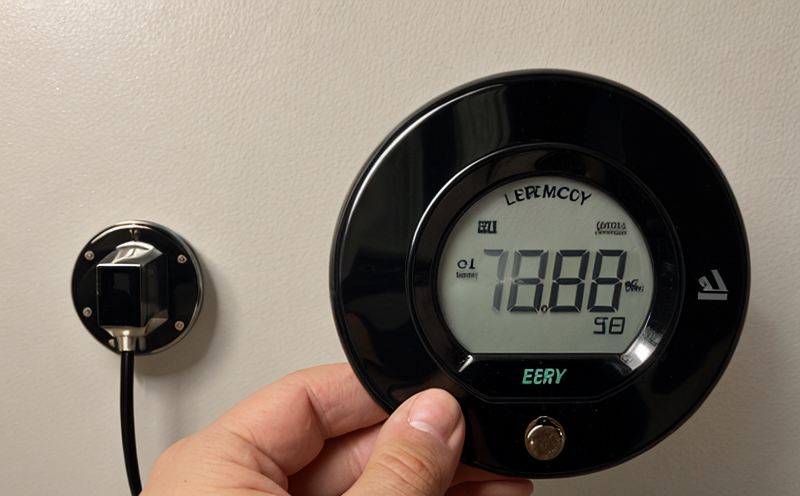Energy Efficiency & Consumption Testing
Energy efficiency and consumption testing are critical components in ensuring that electronic devices, appliances, and systems meet stringent international standards for energy conservation. This testing is especially important as we strive to minimize environmental impact by reducing power consumption without compromising performance or functionality.
The primary goal of this type of testing is to identify the amount of electrical energy consumed by a device during its operation under specified conditions. The test aims to determine whether the product complies with established standards such as those set forth in ISO 5007, ISO/IEC 62301, and IEC 62752.
For instance, when testing an LED lighting system, we would measure the power consumption under various illuminance levels to ensure that it meets specific energy efficiency guidelines. Similarly, for a motor-driven appliance like a refrigerator or air conditioner, we examine its operational mode, startup characteristics, and standby power requirements.
- Why Choose This Test: Ensures compliance with international standards, supports sustainable development goals, reduces operational costs, enhances brand reputation.
- International Acceptance and Recognition: Certifies that products are energy-efficient according to global norms, facilitating market access in numerous countries.
In addition to these benefits, testing also helps manufacturers identify areas for improvement during the design phase of their products. By understanding how much energy a particular component consumes or how efficiently it operates compared to alternatives, designers can make informed decisions about material selection and manufacturing processes.
Another key aspect of this test involves validating that the device adheres to specific thermal management requirements. Overheating is often linked to increased power consumption; therefore, ensuring proper heat dissipation mechanisms is crucial for maintaining optimal energy efficiency levels throughout the product lifecycle.
Apart from these general principles, there are several factors unique to different sectors where this testing plays a vital role. For example, in consumer electronics, minimizing standby power helps extend battery life and reduce overall electricity usage at home. In industrial applications, optimizing motor efficiency can lead to significant savings in large-scale manufacturing facilities.
Given the importance of accurate measurement techniques used during these tests, Eurolab employs state-of-the-art equipment calibrated according to international standards. Our team of experienced professionals guarantees precise results that reflect real-world performance conditions while adhering strictly to applicable regulations.
To summarize, energy efficiency and consumption testing serve multiple purposes beyond just certification compliance. They contribute towards creating more sustainable products by promoting innovation through continuous evaluation processes aimed at reducing waste and improving overall resource utilization rates within industries worldwide.
Eurolab Advantages
Eurolab stands out as a premier provider of energy efficiency and consumption testing services due to its comprehensive approach and unwavering commitment to excellence. Here are some reasons why working with us could be beneficial:
- Expertise: Our highly trained engineers possess extensive knowledge in both theoretical aspects and practical applications related to energy efficiency.
- State-of-the-Art Facilities: Equipped with cutting-edge laboratories designed specifically for conducting accurate measurements under controlled environments.
- Comprehensive Reporting: Besides providing detailed reports on test outcomes, we also offer recommendations tailored towards enhancing the tested product's energy performance further.
- Timely Delivery: Ensuring that clients receive their results within agreed-upon timelines without compromising quality standards.
- Cost-Effective Solutions: By optimizing testing procedures and leveraging technology advancements, we aim to deliver services at competitive rates.
We pride ourselves on maintaining long-term relationships with our customers by consistently delivering reliable and accurate data. This dedication has earned us a reputation as one of the leading laboratories in Europe for conducting such tests.
Why Choose This Test?
- Compliance with International Standards: Ensures that products meet the required specifications as defined by organizations like ISO, IEC, and EN.
- Sustainability: Helps reduce environmental impact by promoting efficient use of resources throughout product lifecycles.
- Economic Benefits: Reduces operational costs associated with energy consumption while potentially increasing profits through improved efficiency.
- Market Access: Facilitates entry into new markets where stringent regulations regarding energy efficiency apply.
- Innovation Drivers: Provides valuable insights that drive continuous improvement efforts within research and development teams.
- Customer Satisfaction: Enhances customer trust by delivering high-quality products that consistently perform as expected.
The importance of conducting thorough energy efficiency & consumption tests cannot be overstated. It not only ensures regulatory compliance but also contributes significantly to the broader goals of sustainable development and responsible resource management across various industries.
International Acceptance and Recognition
Energy efficiency testing holds immense significance not only locally but globally as well. Products that pass these rigorous tests gain recognition from authorities worldwide, opening doors for broader market acceptance.
- European Union: The EU imposes strict directives on energy labeling and product specifications to ensure harmonization across member states.
- American Standards: Compliance with UL standards demonstrates adherence to North American safety and performance criteria.
- Asian Markets: Many Asian countries have implemented their own sets of guidelines based on international recommendations, making compliance essential for export.
- Oceanic Regions: Australia, New Zealand, and other Pacific islands also enforce stringent regulations to protect local environments from excessive pollution caused by inefficient devices.
Beyond mere certification, these tests play a crucial role in fostering trust between manufacturers, distributors, retailers, and end users. Consumers can rest assured that they are purchasing products designed with sustainability in mind when they see compliance labels on packaging or displays.
Furthermore, international acceptance extends beyond just national boundaries; it encompasses regional collaborations aimed at promoting best practices globally. Organizations like the International Electrotechnical Commission (IEC) and International Organization for Standardization (ISO) collaborate closely to establish consistent standards that are applicable everywhere.





